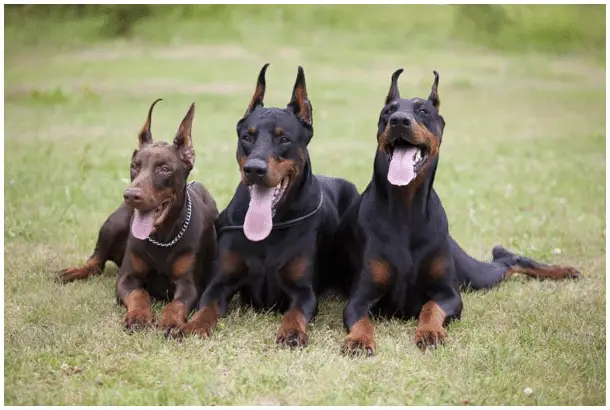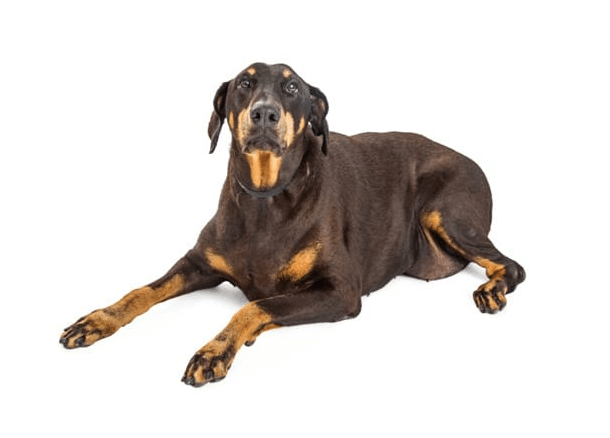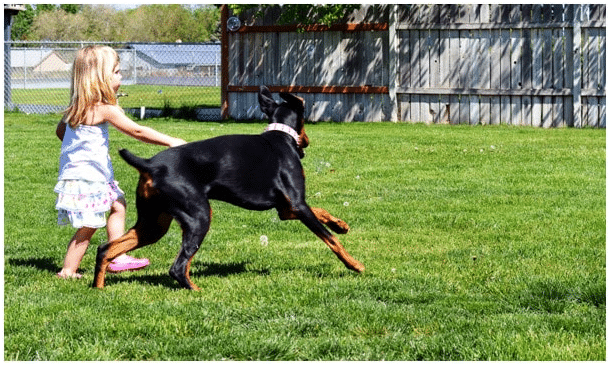You can expect your Doberman to continue growing in height and weight until they are one year old. After that, their growth will slow down but they will continue filling out and maturing for another year. At two years of age, a Doberman is typically completely finished growing.
Of course, all dogs are not alike! Keep reading to learn more about the growth of your Doberman, as well as the factors that impact it and important things to keep in mind.
How Big Do Dobermans Get?
Doberman Pinschers are classified as a large breed of dog, so you should expect your puppy to grow to a sizeable dog after the first year. The first year will see relatively rapid growth, followed by a slower maturation and general filling out until the second year.
You can expect your Doberman to be at least two feet tall and weigh anywhere from about 60 to 100 pounds. Since growth can be unpredictable, it is helpful to prepare as if you will have a Doberman that reaches the maximum height and weight of the breed. That way, you won’t be caught off guard!
In general, Dobermans range in size from medium to large. Differences in sex, genetics, and environmental factors can also impact how big a Doberman gets.
Why Do Some Dobermans Grow at Different Sizes?

It can be frustrating when your dog’s looks and behavior do not match the reports you’ve read online. For example, it may seem like your Doberman is growing differently from others you’ve seen – either too small or too large. There are many factors to consider when it comes to Doberman’s growth.
- Gender. On average, male Dobermans will end up taller and heavier than their female counterparts. Remember this when comparing your Doberman to others. In addition, females tend to reach a mature appearance a bit faster than males.
- Genes. Sometimes it all comes down to genetics! The parents and siblings of your Doberman will often be good clues for how fast and how big your dog will grow. If something seems slower or faster than what you’ve read, it may just be all in the family!
- Nutrition. Diet plays a large part in growth, especially for large breeds like Dobermans that grow rapidly in their first year. A high-protein diet and healthy food (not in excess) will help your Doberman grow. Likewise, a poor diet early on could be a reason for differing sizes.
These are a few of the most common factors that could impact the size of your Doberman. If you are concerned about the rate of growth or overall size of your dog, you should reach out to your vet for a consultation.
What is the Average Weight and Height of a Doberman?
Now that we’ve clarified how big Dobermans generally get, it is important to know the average height and weight they will reach. This helps you to prepare your home and space, as well as know what to expect once your puppy starts to grow.
On average, male Dobermans will be about 27 or 28 inches tall from the shoulders and weigh somewhere around 70 pounds. Females will be 25 to 27 inches tall and weigh closer to 60 pounds. This can vary depending on genetics and health conditions, but most Dobermans will fall in these ranges.
As described, you can expect your Doberman to reach its average height after about one year. Over the course of growing from 12 to 24 months, your Doberman will finish filling out and maturing and should reach its average weight.
Is it Possible for a Doberman to Grow Again After They Have Stopped?

As we’ve covered, factors such as genes, gender, and nutrition can all impact how your dog grows and what size they end up being. And as a large dog, you will notice the rapid growth rate of your Doberman over the first year of its life. Yet for many owners, this growth rate can be confusing.
It may appear that your Doberman sprouts up over a year and then stagnates before suddenly growing again. In actuality, large dogs simply take a longer time to reach their mature form. The first phase of growth is very obvious, and the slower filling out is harder to see.
While it may seem like your Doberman has started growing after they stopped, it might simply be that they are slowly filling out in a less obvious way. After two years have passed, your Doberman will not continue growing unless there is an underlying condition, which is rare.
Is There Anything I Can Do to Help My Doberman Grow Taller or Bigger?
Dobermans have a reputation as big, protective dogs who are great for guarding their family. As a result, you might want to know how to help your Doberman grow as big and tall as possible! While most results are down to genetics and time, there are several things you can do.
- A healthy diet that encourages muscle growth. Dobermans are naturally muscular dogs, so a diet rich in protein and other nutrients will allow them to grow. It is recommended that Doberman puppies have at least 22% protein in their diets to fuel their growth.
- An exercise regime that builds muscle. There is not much you can do about overall height, but building muscle is possible with sufficient exercise. Resistance-based exercises like swimming or running uphill are excellent ways to build your Doberman’s muscles.
- Don’t overdo anything. While it may seem counter-intuitive, you should avoid overexercising or feeding your Doberman too much protein, especially when they are young. Overdoing it can actually end up stunting their growth, and your vet should always be consulted.
These are the primary ways you can help your Doberman to grow big and tall. However, it’s important to remember that the average size and height are out of your control, and Dobermans are naturally large anyway!
How Much Exercise Should Dobermans Get Each Day?

Dobermans are a very muscular and athletic breed, and sitting around all day is not one of their personality traits! They need plenty of exercise and stimulation in order to get rid of their energy and build up their muscle. In fact, it is recommended that Dobermans get at least two hours of exercise each day.
This exercise can take several forms, from walks and runs to games of fetch and playful wrestling on the living room floor. If you are very busy and can’t guarantee enough exercise each day, hiring a dog walker or asking a family member to visit during the day and take your dog on a walk is a good idea.
While providing lots of exercise is a good way to help your Doberman build muscle, you should not begin strenuous exercise too early. As a puppy grows, their bones and joints are not yet fully formed. Activity level and involvement in physical family activities should therefore increase gradually over time, to avoid any potential health concerns.
What Type of Diet Should You Provide Your Doberman?
Since diet is so important for growth, let’s talk about the best kinds of food to feed your Doberman! As mentioned previously, a higher protein diet is a good idea for puppies, as their bodies need proper fuel to prepare for their rapid growth. Once they’ve reached their average height, less protein is needed.
In general, a high-quality diet that is easy to digest will be best! Solid food that contains primary ingredients such as chicken and beef is ideal. Whole grains like brown rice and sweet potatoes are also good examples.
To ensure continued growth and healthy weight gain, try to avoid harder-to-digest and less palatable grains. This includes corn or wheat and other fillers. Furthermore, avoid giving too many table scraps or unhealthy treats, as these can cause additional weight gain in your Doberman.
Does a Doberman’s Size Affect Their Health?
As a medium to large dog with a muscular body, your Doberman may be more likely to experience issues related to health. However, these are nowhere near as obvious as in giant dog breeds. While choosing a reputable breeder is crucial, there are some potential health issues that are sometimes unavoidable.
Joint issues. Larger dogs can have issues with their joints filling in and settling as they grow, usually as a result of intense exercise before their body is fully ready.
Bone problems. Similar to joint issues, you may notice problems in bone growth and health caused by the rapid growth a Doberman will experience. Luckily, your vet knows to check for such issues at annual check-ups.
Bloating or stomach issues. Bloat and stomach issues are common in dogs with deep and narrow chests. As a large and lean dog, this means Dobermans are more susceptible to bloating issues.
If you have any major concerns with your Doberman’s health, always go for a checkup with your Vet. While some diseases are unavoidable, early intervention is key in promoting a longer life for your pet.
Final thoughts
Waiting for your Doberman to finish growing can be a stressful process, but there is nothing to worry about! After two years, you can expect to have a healthy and full-grown Doberman as your favorite companion.
Just remember to stay on top of vet visits, exercise needs, and dietary requirements. With these factors taken care of, you’ll have a big and strong Doberman in no time!


